Feel Better: 30-Day Mental Health Challenge (+ Free Printables)

While it might not be as trendy as money challenges, this powerful 30-day mental health challenge I’ve crafted is impactful—and is something everyone should try at least once to feel better and stress less.
This isn’t about diving into books, mastering meditation techniques, or scheduling therapy sessions. And let’s face it: cliche suggestions like “go outside” or “exercise” have lost their appeal after hearing them a million times, so you won’t find those here.
Instead, this challenge is about nurturing your mental well-being with simple, actionable steps to help keep your mind and soul healthy and thriving. Whether you’re currently grappling with mental health issues, have a diagnosis, or want to maintain a healthy mindset proactively, there’s something here for you.
📌 Please Note: This challenge isn’t a replacement for professional mental health support or treatment, and you should consult with a doctor for any mental health concerns you have.
This post contains affiliate links, which means I may earn a small commission if you make a purchase, at no cost to you. See my disclaimer for more info.
Personal Reflection

In late 2020, I launched this platform with a simple goal: to offer practical advice, self-care tips, and ideas for a more balanced, less stressful life. Little did I know that nearly four years later, I’d still be here.
One of my driving forces has been my passion to have open conversations about mental health, especially anxiety.
I wanted to approach it in a way that felt encouraging, breaking down what can often seem like a complex or overwhelming topic into something more accessible so I could help to chip away at the stigma.
So, I’m excited to embark on this 30-day mental health challenge and invite you to join. Better yet, tell a friend so you can do it together, helping to hold each other accountable and even having quality social time together. You never truly know how people are doing internally, so this may help a loved one in need. ❤️
What is a Mental Health Challenge, and Why Do One?
A mental health challenge, like any 30-day challenge, means committing to doing something specific every day for a month.
It’s a way to help you build new habits, grow personally, and work towards your goals, so it’s worth taking. A 30-day challenge gives you a chance to make positive changes and feel better overall.
Why You Should Do This Challenge?
30-day challenges are a great activity because they get you out of your comfort zone and help keep you on track with a goal or a new habit you want to create.
When you consciously decide to take on a challenge, you’re more inclined to follow through with what you’re working towards than if you loosely say something like, “I need to eat better” or “I should do more exercise.”
I’ve found that these challenges also help me develop better routines and often help me eliminate unhealthy habits or at least improve on them, which is a win-win situation. ✅
A few 30-day challenges I do yearly:
- Self-Care Challenge for a Happier, Healthier You
- No-sugar challenge
- No spending challenges (usually in January)
- Social media detox challenge
- Self-care challenges
It’s enjoyable to try something new, and when you stick to it, you’ll feel accomplished and gain a little confidence in your ability to see things through.
GRAB YOUR FREE PRINTABLE PLANNER
A powerful way to stay on track is to use a simple planner, so I created the Feel Better, Stress Less: Mental Health Challenge Planner for you. It includes two calendars, a planning sheet, and a review sheet. Put your email in the box below to instantly get your free gift straight to your inbox.
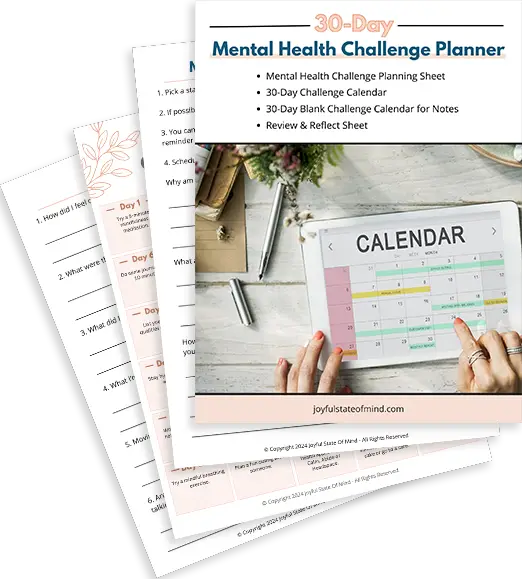
Who Should Do a Mental Health Challenge?
This challenge is for anyone looking to feel better and improve their mental well-being. There’s no downfall to taking one, and at the very least, it gets you thinking about ways to improve something and make progress on a goal.
Whether you’re dealing with stress or anxiety or want to boost your mood, a 30-day challenge can make a positive difference in your life and also help motivate you to take action, no matter how small.
Benefits of a 30-Day Mental Health Challenge

There are many reasons and benefits to take a mental health challenge, and two primary benefits are:
- It gives you that initial push to kickstart positive change in your life.
- Each day’s progress helps fuel your momentum to stick with the change and persevere.
Other Benefits:
- Boosts Mood and Reduces Stress: Engaging in mindfulness practices and relaxation techniques helps reduce your stress levels and improve your overall mood. (1-MayoClinic)
- Enhances Self-Awareness: Participating in reflection exercises or journaling prompts can help you become more self-aware and in tune with your emotions. (2-WebMD)
- Builds resilience: Regularly practicing resilience-building activities, like gratitude exercises or positive affirmations, can strengthen your ability to cope with challenges and setbacks. (3-American Psychological Association)
- Fosters a sense of accomplishment: Completing a 30-day mental health challenge can also instill a sense of achievement and empowerment, which helps boost your confidence and self-esteem. (4-Verywell Mind)
So, let’s dive into the challenge and kickstart some fresh, healthy habits.
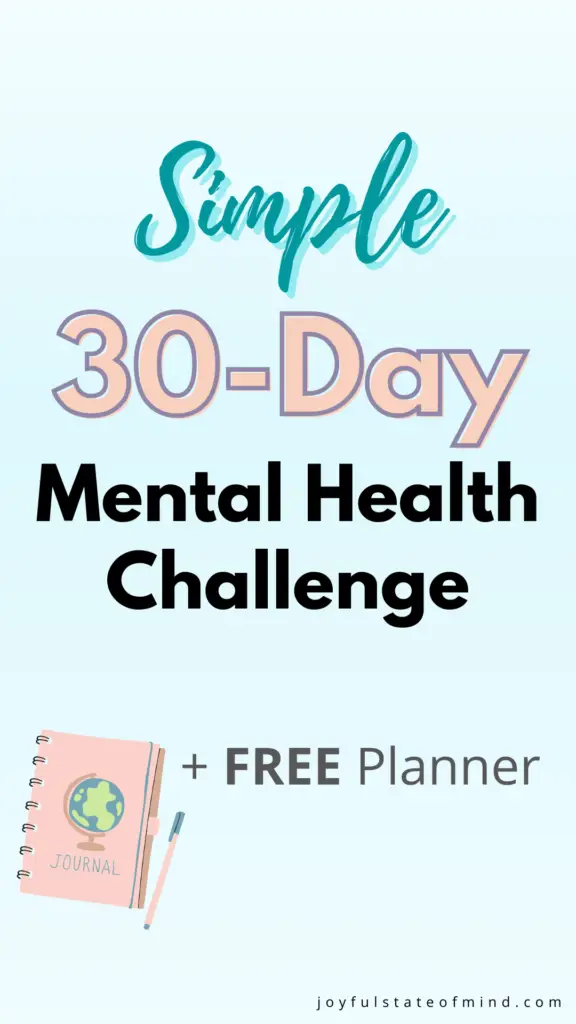
Feel Better: 30-Day Mental Health Challenge
Each task in this mental health challenge is designed based on research from positive psychology, Cognitive Behavioral Therapy (CBT), and mindfulness practices.
This isn’t about trying to fix things overnight or tackling emotional hurdles at once. Instead, it’s about embracing a proactive mindset and committing to manageable steps forward each day.
Over the next month, we’ll focus on putting energy into simple daily actions, which help promote mental wellness.
As James Clear famously states in his book Atomic Habits, the magic lies in the consistency of small actions. So by taking on this 30-day challenge, we’re not just aiming for quick fixes; we’re laying the groundwork for long-lasting change
Week #1: Daily Challenges
Day 1 – Try a 5-Minute Mindfulness Meditation.
I’ve been working on being more mindful for the past few years because my therapist recognizes the value of mindfulness activities in reducing and helping manage Generalized Anxiety disorder.
Mindfulness basically means living in the present moment. It’s about consciously tuning into each moment, fully aware and engaged with what’s happening around you. And it’s about doing so with acceptance, without passing judgment on yourself or your surroundings.
Try this meditation below. I found it to be five of the quickest minutes because it was so relaxing and calming.
Day 2 – Disconnect from your phone for 2 hours.
Put your phone on mute or do not disturb and/ or place it in another room for at least a couple of hours; if you can do longer, that’s even better! We’ve become addicted to our phones, and they’ve become like social crutches or safety mechanisms to cling to when you’re alone.
Day 3 – Schedule a wellness appointment.
Take some time to book an upcoming wellness appointment—whether it’s your annual physical, a dental exam, a therapy session, a massage, or even a pedicure. No excuses; spending time on your well-being is essential to good mental health.
Related article: 65 Mental Health Gifts to Elevate Your Well-Being
Day 4 – Be mindful not to complain for the day.
Complaining can become a firmly ingrained habit, so being intentional about not complaining or changing your perspective on something that frustrates you is a powerful mindset shift and, hopefully, something you can stick with.
Day 5 – Have a 5-minute solo dance party!
Don’t be shy if you’re alone or if you’re doing this with a partner; that can be even more fun. Blast your favourite song or repeat it and dance for at least 5 minutes. Of course, if you get into it and have a playlist, keep going. Sometimes, I’ll dance for 20-30 minutes on my own as my cardio workout for the day. If you want to follow a routine, I love the MadFit dance workouts.
Day 6 – Take 10-15 minutes to write.
If you like journaling, you can do some freestyle writing, but if you’re new to journaling or not sure what to write, here are two prompts to answer:
- Write down the best advice you’ve ever received. Why was it helpful?
- What makes you feel at peace and why?
Journaling is a proven method of reducing anxiety, so it’s a powerful habit to cultivate. Journaling on blank pages can be daunting, so I created an easy-to-use stress-relief journal that includes valuable mental health resources, such as mindfulness activities, effective coping strategies, a self-care challenge, journal prompts, and more. To get your copy, click on the image below:
Day 7 – Text someone for a boost of confidence.
It’s not just any random text, though. I challenge you to message two close friends or family members with this personalized request:
“Hey [Friend’s Name], I have a task (or work exercise), and I could really use your help. Could you list two of my best qualities and why you appreciate me?”
I’ve tried this before, and let me tell you, it works wonders for lifting your mood and boosting self-confidence. Sometimes, we forget our own worth, and hearing from others can be a powerful reminder of our strengths.
Week #2: Daily Challenges
Day 8 – Make it a day of hugs.
Hugs are fantastic for your mental well-being. So today, give warm hugs to others, including pets—they count too! And if you’re alone, don’t hesitate to hug yourself—it’s also a form of self-care.
Research shows hugs make us happier by reducing stress and loneliness because they release feel-good hormones like dopamine, serotonin, and oxytocin, making us feel less anxious and more connected. Hugs also boost our immune system, make us feel safer, ease pain, and build trust. (5)
Day 9 – Have your morning tea outside. ☀️☕
There’s no denying the benefits of sunshine, nature, and fresh air on your mental health. So, instead of staying indoors, take your morning drink outside. Sit and savour the drink and your surroundings so you can focus on being relaxed and feeling peaceful.
Related article: 35 Must-Have Tea Lover Items for Every Tea Enthusiast
Day 10 – Reconnect with an old friend.
Take a moment to call a friend so you can reminisce and nurture that valuable connection! Maintaining social connections is crucial for mental health because they provide support, reduce stress, and promote a sense of belonging.
The American Psychological Association notes that even a brief interaction with an old friend can uplift your mood and strengthen emotional resilience, enhancing your overall psychological wellness (7).
Day 11 – List your top qualities.
Take out a pen and notebook and write out your 6 top qualities. This is just for you, so dig deep and think of what people often compliment you on or say about you. What are the characteristics you’re most proud of and why?
Some examples are compassion, generosity, humour, loyalty, honesty, kindness, bravery, assertiveness, patience, creativity, and being fun-loving.
Day 12 – Create 2-3 personal positive affirmations.
This builds on yesterday’s activity and is meant to help you develop confidence and cultivate self-compassion. The most common affirmations are “I am” statements, but they can be any affirmation that makes you feel good.
For example:
- I have overcome so much and am still standing.
- I am grateful for my health and take each day as it comes.
Day 13 – Take a gratitude nature walk.
Today is about merging the benefits of walking with practicing gratitude. A gratitude walk is a simple yet impactful activity in which you mindfully stroll and engage all of your senses to soak in your surroundings and express some thankfulness out loud.
This walk isn’t about saying things out loud the whole time. It can be as simple as bending down to look at a flower and saying how beautiful it is or taking deep breaths and thanking God for the wonder of nature and the blessings in your life.
Related article: 170+ Gratitude Affirmations For More Joy In The Moment
Day 14 – Organize one drawer in your home.
Decluttering and organizing help promote mental clarity and enhance productivity. So, tackle just one drawer to create a sense of accomplishment. This positively impacts your overall well-being, and I also love finding things I forgot about or thought I lost.
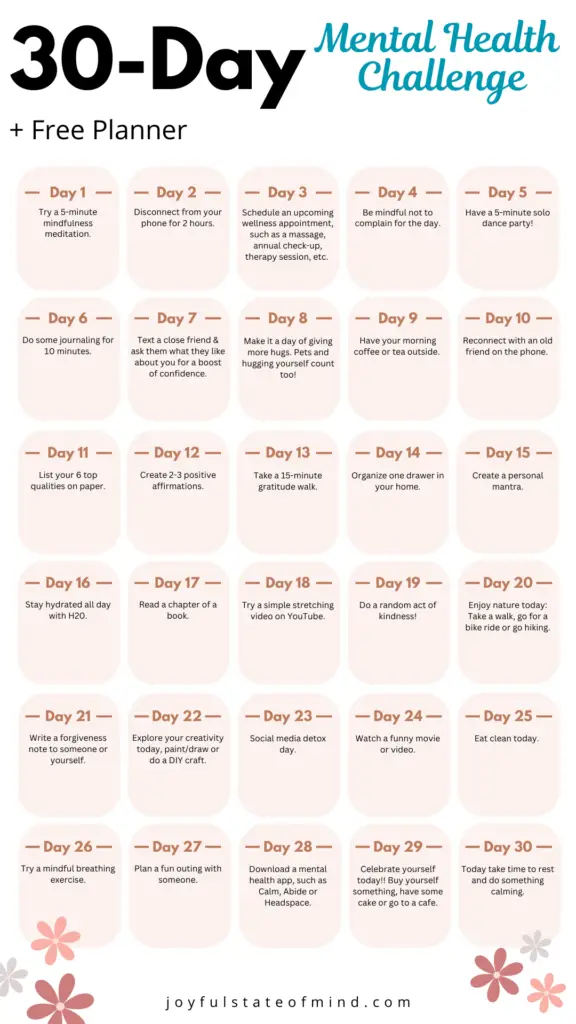
Week #3: Daily Challenges
Day 15 – Create a personal mantra.
Developing your own life motto is a meaningful but fun activity—and if you already have one, that’s great. Then, try to come up with a second one. Of course, as we grow, our mantras change and evolve, and that’s perfectly okay.
This personal mantra is like a little guide for your life, so think about what truly matters to you. What are your hopes, goals or dreams? What legacy do you want to leave?
Some examples:
- I will choose to see the good in each day, no matter what.
- My joy is not based on my circumstances but on God’s presence in my life.
Day 16 – Stay hydrated with H20.
Today, drink at least 8 glasses of water. Drinking enough H20 throughout the day keeps us feeling fresh and focused because it helps our bodies function smoothly, from better digestion to temperature regulation, and it helps boost our energy levels. (6)
Day 17 – Read a chapter of a book.
Having quiet ‘me-time’ to focus your mind on an adventurous or compelling story is a perfect way to relax and unwind because your mind is engaged in something positive and entertaining.
Day 18 – Embrace simple stretching.
Try a simple stretching routine today. Stretching is great for both your body and mind because it improves flexibility, reduces muscle tension, and enhances your circulation. Mentally, it also helps relieve stress by promoting relaxation and releasing endorphins, the feel-good hormones.
Harvard Health notes that regular stretching can also improve posture and prevent injuries, keeping you feeling good inside and out. (9)
Here is a great beginner full-body stretch routine you can follow:
Day 19 – Random act of kindness for the win!
Being kind isn’t just nice—it’s also great for your mental health. Random acts of kindness release feel-good chemicals like dopamine and oxytocin in your brain, making you happier. Plus, being kind helps strengthen social connections and gives you a sense of purpose, which is essential for mental wellness.
For simple ideas you can do, check this post: 55 Incredibly Easy Ways to Spread Kindness.
Day 20 – Enjoy nature: bike or hike.
Get outside and go for a nature walk, bike ride, or short hike because being outdoors and getting vitamin D from the sun naturally boosts our mood and helps reduce stress.
Research from the University of Essex shows that being in nature, even for 5 minutes, can improve our mental well-being (8). So, take a break from indoors, breathe in the fresh air, and soak up the beautiful scenery!
Day 21 – Write a forgiveness note.
Forgiving someone isn’t about excusing their behaviour—it’s about finding inner peace and moving forward in a healthy way. So take 15 minutes or so to jot down a straightforward forgiveness note for someone who has hurt you.
Alternatively, you can also try writing a note to yourself, addressing a past mistake or an issue you’ve been hard on yourself about.
30-Day Mental Health Challenge Final Week: Daily Challenges
Day 22 – Explore your creativity.
Relax and do something creative today, such as painting, adult colouring, or simple DIY crafts. This is a great way to unwind and focus on creating something for your home or office decor.
Day 23 – Social media detox day.
Today’s task is simple: Say no to social media. Turn off notifications, delete apps from your phone (you can always reinstall them later), or keep your phone out of reach to resist any temptation.
Social media often amplifies stress and anxiety, so liberate yourself from this trap for the day; it might even inspire you to cut down on your overall usage.
Related article: Easy 30 Social Media Detox (+ FREE Planner)
Day 24 – Watch a funny video.
Laughter is like soul medicine and is one of my favourite ways to destress. So today, watch your favourite comedy movie or show or hop onto YouTube to watch hilarious movie clips or videos from your favourite comedian.
Related article: Stressed Out? The 43 Best Funny Stress-Relief Quotes
Day 25 – Eat clean all day. 🥕🍎🥑
Avoid processed foods and refined sugars today. Opt for healthy meals and snacks packed with lots of veggies and foods rich in omega-3 fatty acids (like salmon or chia seeds), folic acid (such as leafy greens and lentils), folate (beans and citrus fruits), vitamin B12 (eggs or fortified cereals), and vitamin D (include fortified dairy or mushrooms).
Day 26 – Try Mindful breathing.
Deep breathing has been a go-to for me to ease anxiety and stress, so today, I encourage you to explore a variety of simple, mindful breathing techniques.
DBT-Dialectical Behavior Therapy reached out to me and shared what their site offers and how they can help you. I was excited to learn they have free lessons focused on enhancing practical mindfulness skills. Each lesson is designed with a video, a text lesson, and a worksheet to enhance your learning experience. Today, your challenge is to try mindful breathing to destress and unwind, click the link below to see the different techniques you can try:
Day 27 – Plan an outing with someone.
Plan for some upcoming fun. Check your schedule, select some free dates, and invite someone you enjoy spending time with for an outing. Then, plan something enjoyable for the day, whether treating yourselves to a massage, visiting an art gallery, or dining at a restaurant.
Day 28- Download a mental health app.
Now that you’re almost done with this 30-day mental health challenge, take a proactive step and download a mental health app. Look for free options that offer techniques and tips, or if you can, consider investing in a paid version for more features. Some apps that you can look into are Calm, Headspace, Abide (faith-based), and Happify.
+Day 29 – Celebrate Yourself Today!! 🎉
You’ve come this far and deserve to give yourself a big pat on the back however you see fit. Maybe you want a long bath, a trip to your favourite bakery, or treat yourself to a new book. For over 20 fantastic ways to celebrate yourself—whether free, budget-friendly, or a splurge—check out this post: 23 Fun Ways To Celebrate Yourself.
Day 30- Day of Rest and Reflection
“Productivity is not how much work I do in a day but how well I balance what I need to stay healthy. Being productive is knowing when to rest.” -Rupi Kaur
I can’t emphasize enough how crucial quality rest is for our mental health. Society often promotes constant hustle and nonstop productivity, but that path leads to burnout and mental health challenges like anxiety and depression. Today is dedicated to your peace of mind, body, and soul, so take time to simply BE!
Relax, don’t overthink, and look around at all the simple things that make your life good.
Related article: Self-Care Sundays-60 Ulitmate Ideas to Relax & Recharge
The Challenge is Over, Now What?

Number #1: Congratulate Yourself! 🤩
You had the wisdom to try a 30-day mental health challenge, which takes courage, discipline, and energy, so that’s an accomplishment to be proud of.
Number #2: Decide How You Want to Move Forward.
Now, reflect on your experience with this mental health challenge. Was it hard? What parts did you like? Did it help you?
You might have found it was easier than you expected, and it probably felt good and rewarding.
When you’re back to your usual routine, think about what you can do daily to feel better emotionally.
Then, consider incorporating small practices into your day, like mindful breathing or affirmations, to kickstart your mornings. If you downloaded a mental health app, there are activities you can do there daily.
Reflect on what worked well and jot down ways to weave these into your daily routine using the planner I created. You’ve got this! 💯
30-Day Mental Health Challenge: Keep Taking Steps Forward
Congratulations on completing the 30-day challenge! Remember, improving your mental health doesn’t have to be overwhelming. It’s all about taking small, manageable steps like the ones you’ve already accomplished.
If you ever feel unsure or overwhelmed, don’t hesitate to seek help from a professional because they can provide valuable support and guidance tailored to your needs. Therapy and medication have been helpful for many, including me, so those are other options to explore if needed.
Keep moving forward, one step at a time, and remember that you’ve already shown that you’re capable of making positive changes for your well-being. Keep up the great work!
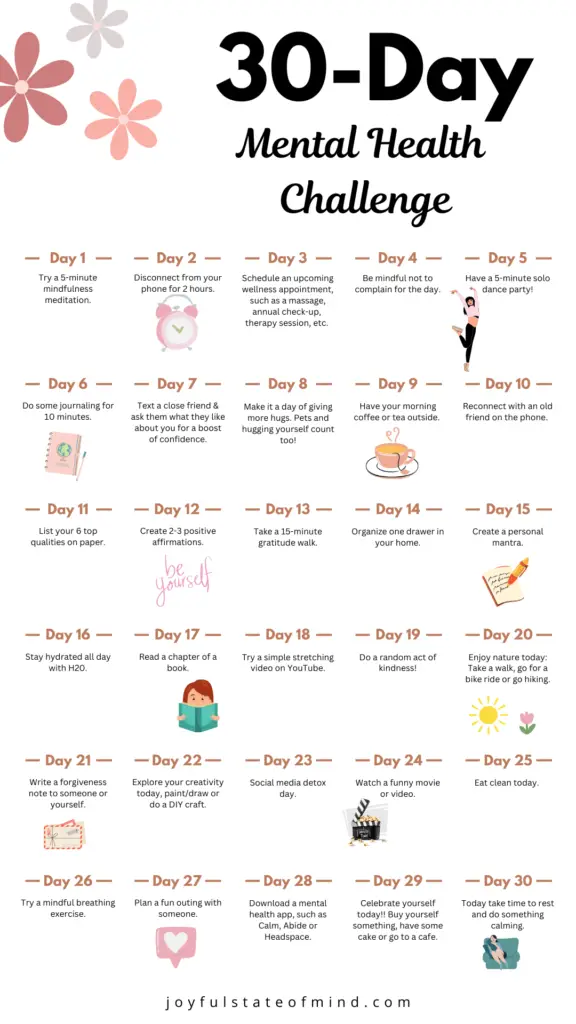
Mental Health Frequently Asked Questions
1. What exactly is mental health?
Mental health refers to our emotional, psychological, and social well-being, which includes how we think, feel, and behave. Stable mental health helps us cope with life’s challenges, form healthy relationships, and work more productively. The good news is that mental health disorders can be treated, effectively managed, and, in some cases, overcome. Read more about this in #3 below.
2. What are the most common mental health illnesses?
Some of the most common mental health struggles and illnesses include anxiety disorders, depression, bipolar disorder, schizophrenia, eating disorders and post-traumatic stress disorder (PTSD). These conditions can vary in severity and impact people quite differently. (10)
3. How do I get treatment for mental health?
Treatment for mental health concerns typically involves a combination of therapy, medication, lifestyle changes, and support networks. Seeking help from a mental health professional such as a psychotherapist, psychologist, or psychiatrist is an essential first step. Additionally, resources such as hotlines, support groups, and community mental health centers can provide valuable assistance. It’s crucial to consult a healthcare provider to determine the most appropriate treatment plan based on your individual needs.
4. Is there a mental health day?
Yes, there is a designated World Mental Health Day, and it’s observed every October 10th. The purpose of this day is to raise awareness about mental health issues worldwide and mobilize efforts to support mental health. May is also Mental Health Awareness Month in North America.
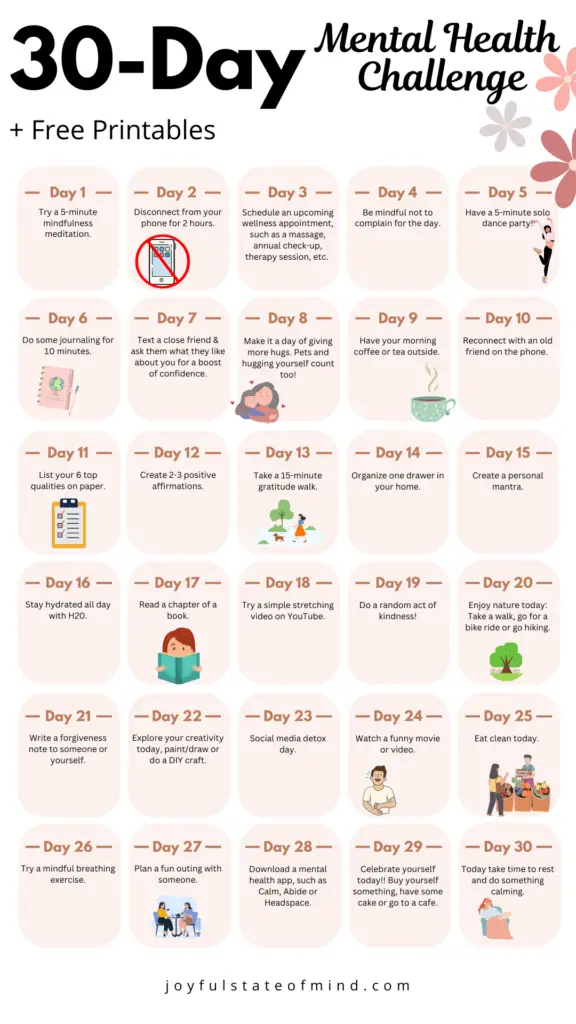
References:
- https://www.mayoclinic.org/healthy-lifestyle/stress-management/in-depth/relaxation-technique/art-20045368
- https://www.webmd.com/mental-health/mental-health-benefits-of-journaling
- https://www.apa.org/topics/resilience/building-your-resilience
- https://www.verywellmind.com/do-thirty-day-challenges-work-4164524
- https://www.medicinenet.com/how_do_hugs_make_you_feel/article.htm
- https://www.hsph.harvard.edu/nutritionsource/water/#:~:text=General%20recommendations,exposed%20to%20very%20warm%20climates.
- https://www.apa.org/monitor/2023/06/cover-story-science-friendship
- https://www1.essex.ac.uk/news/event.aspx?e_id=1588
- https://www.health.harvard.edu/staying-healthy/the-importance-of-stretching
- https://www.who.int/news-room/fact-sheets/detail/mental-disorders
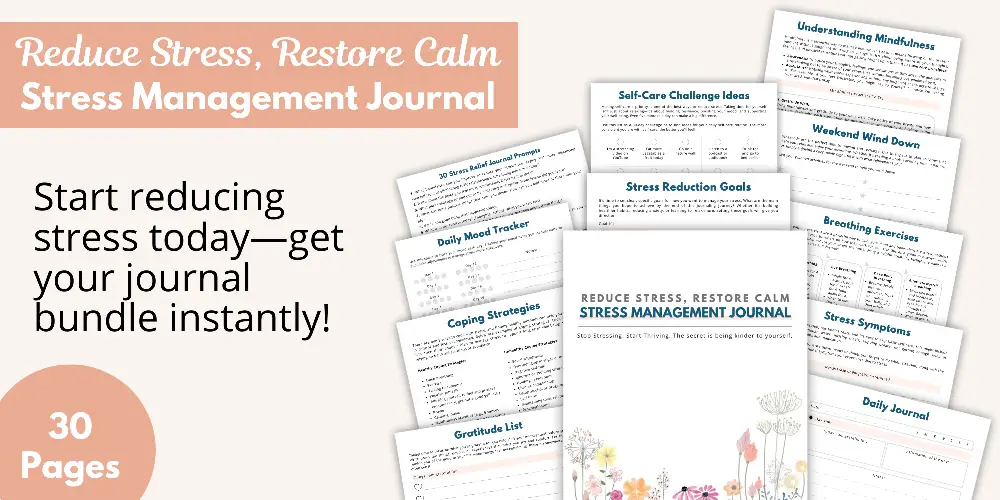






This is such a good idea to kick off May. I love how you have it structured. I’m going to start today and try to stick to it all month!
Jill
That’s awesome, Jill! I’m so glad you’re participating, let me know how it goes:)
A day of hugs…I love this one! Sometimes hugs just make everything better. Thanks for sharing all of these wonderful tips!
Shauna
I agree; hugs are the best and really help with destressing! You’re welcome, Shauna 🙂
Oh Martha, what a fantastic challenge!! Sorry I’m popping in late in the month, but I could definitely see myself trying it out another month. I love how comprehensive this is, you always put so much time and thought into each one of your posts!!
Wishing you a fantastic weekend my dear friend!! 🙂
Thanks so much for the kind words, Ashley! I would love to hear how it goes when you try it, keep me posted. 🙂
I LOVE this post. I found it to be so helpful. Small, daily things like this are so powerful for working towards a more positive place.